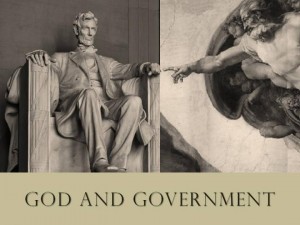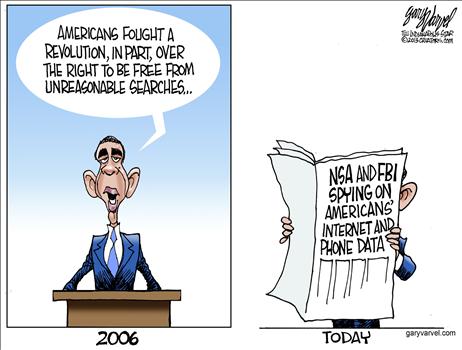The latest political firestorm, the revelation of the extent of the NSA’s data-mining to include storage of records of nearly all phone calls placed by American citizens, has led to deep concerns about the liberties supposedly guaranteed by the Constitution, particularly the Fourth Amendment’s protection against unreasonable searches and seizures. These concerns are showing up regularly in political cartoons such as this one:
I share that concern. I believe in liberty. However, this controversy has also helped highlight two very different definitions of liberty, one I believe to be true and the other false. My worldview is Biblical, so I want to view everything through that prism. There is a Biblical basis for liberty, properly understood, that is not the same thing as modern libertarianism. In fact, I consider that movement, however right it may be on some points, to be destructive of true Biblical liberty.
Here’s the difference: pure libertarians put the concept of liberty on a pedestal as the highest virtue. They are devoted to the idea that everyone should be able to do whatever they choose without any government telling them what is right or wrong. That is not liberty; it is license, and there’s a big difference. Now, the best libertarians do say that one’s actions can’t bring harm to another; I realize that. Yet what is their standard for determining “harm”? Pure libertarianism doesn’t think there’s a place for government to legislate on matters such as abortion, homosexual behavior, or anything else they deem private morality. Man is free to do as he wishes.
Again, I am a great believer in free will; that’s one of my theological cornerstones. But freedom—liberty, if you will—exists only within a framework of eternal right and wrong, and it is always attached to personal responsibility. Yes, I am “free” to sin, but there will be consequences. My sins, and those of others, don’t affect me alone; they ripple out into society and damage others, even those sins that some think are purely private. What you are in private will eventually show up in public. What you do in the privacy of your home will affect your character adversely over time, and that will be detrimental to society as a whole.
For many libertarians, civil government is no better than a necessary evil. I understand how one may come to that opinion even apart from libertarianism just by watching the actions of an administration such as the one under which we currently suffer. Yet government is not an evil, not if I truly comprehend the Biblical explanation of its source and purpose.
 The most basic passage in the Bible about government is Romans, chapter 13. If you read it carefully, here is what you learn:
The most basic passage in the Bible about government is Romans, chapter 13. If you read it carefully, here is what you learn:
- God is the one who has established civil government authority.
- We are supposed to obey legitimate authority.
- Government is a minister of God for good.
- Government officials bear the “sword” to bring judgment upon evildoers.
- We are obliged to pay taxes for the maintenance of that government [sorry about that one].
Implicit in the passage is the opposite: if government doesn’t carry out its God-given authority and becomes an enemy of the good, promoting evil instead, one’s obligation to obey everything it says is modified. Otherwise, we would be making government our god; but government is accountable to the One who established it and set up its boundaries.
Consequently, there is nothing unchristian about criticizing a government that oversteps its legitimate authority and/or advocates evil behavior. When the IRS unfairly singles out conservatives, abridging their freedom of speech, we can resist that and call for remedy. When the DOJ attempts to criminalize journalism, we can demand a redress of this grievance. When the NSA chooses to collect phone records and e-mail communications from the entire population, we can remind them that the innocent are not to be treated as if guilty without due process of law. When an administration covers up a botched operation in Benghazi that led to loss of life, it needs to be called to account for its actions and inactions, and those involved hardly should be promoted.
So, in those instances, from my Biblical foundation, I fully support genuine liberty. But that’s not the same as having a predisposition against all authority and harboring a view that all government is inherently evil. What bothers me most, I think, is the tendency of libertarianism to morph into a kind of semi-anarchy. Yes, the collectivism of Marxist ideology is perverse, but a state of near-anarchy is not the solution. It is an evil in the opposite direction. Further, the unforeseen consequence of throwing off most civil government and societal regulations will be an unwitting return to heavy-handed rule via the Darwinian principle of survival of the fittest. Neither option is the Biblical way.
Therefore, while we should voice our concerns over violations of civil liberties, let’s avoid the temptation to dismiss all the proper functions of government: protection of its citizens from attacks both foreign and domestic, and the administration of justice by rewarding those who mirror Biblical morality and by meting out punishment to those who undermine that morality through murder, theft, and all other forms of evil.
Civil government comes from God. Now, let’s just make sure it does what God intended.

